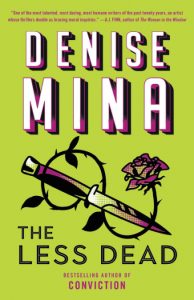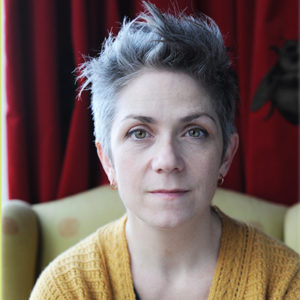While it was Denise Mina’s historical crime novel The Long Drop that first got me hooked on her writing, the Scottish writer’s contemporary psychological thrillers have proved to be just as satisfying. In her latest, The Less Dead, a doctor facing a difficult decision finds out that her birth mother was murdered soon after her birth. She and her foul-mouthed maternal aunt team up to track down a killer who’s evaded detection for decades. This is no cat-and-mouse game between a psychopathic genius and an even-more-brilliant detective, however. This is a grinding noir about life on the margins, and what happens to the vulnerable when the powerful look away (common themes in Mina’s socially conscious work). Denise Mina was kind enough to answer a few questions about her latest over email.
 MO: Without giving anything away, it seems as if you set out to counteract the myth of the diabolically clever serial killer. What are your thoughts when it comes to the way that society mythologizes serial killers to the point of making them, as Catherine Ryan Howard put it, into “dark magicians”?
MO: Without giving anything away, it seems as if you set out to counteract the myth of the diabolically clever serial killer. What are your thoughts when it comes to the way that society mythologizes serial killers to the point of making them, as Catherine Ryan Howard put it, into “dark magicians”?
DM: Serial killers are fairly new boogie men, they were first defined in the 1970s and yet we talk about them as if they’ve always existed. It’s a social construction, like witches, they aren’t spontaneously occurring geniuses. Time and again cases come up that don’t fit the model: women don’t fit, Mexican cartel killings don’t fit, many white male multiple killers don’t fit the serial killer model. Another way to read them is as a failure of policing: they exist because they don’t get caught the first time they kill someone. What’s really interesting is why we need to believe in them. Mostly they’re just brutal idiots.
MO: Has the lockdown changed how you work, or how you structure your writing habits?
DM: Honestly, Im going out a bit more than I normally do. I’m traveling a lot less for promotion and that has freed up and incredible about of time! When I’m not terrified I’m loving it.
MO: Your latest has a theme of “there, but for the grace of god”—your main character understands that, had she not been given up for adoption to a good family, she might well have followed in her prostitute mother’s footsteps, and if her mother had an easier origin story, she might well have become a professional. What did you want to explore about intergeneration trauma, and the cycle of poverty?
DM: I wanted to look at how blind most of us are to our own privilege, and how often we make the mistake of believing our circumstances are a result of our own striving. Also to honour those women who were killed. The heroin epidemic in Scotland was treated as a public order problem because it happened to poor people, instead of a tragedy, which was what it was.
 MO: The antagonist in your latest exists in a prison of his own misogyny, something you’ve explored with characters before. Is it taxing to put yourself in that headspace when you’re writing? Where do you draw from in creating your villains?
MO: The antagonist in your latest exists in a prison of his own misogyny, something you’ve explored with characters before. Is it taxing to put yourself in that headspace when you’re writing? Where do you draw from in creating your villains?
DM: I find it exhausting. I’m watching the documentary ‘Shoah’ at the moment and what is staggering is that it looks straight at, and challenges, antisemitism when the natural reaction is to look away. It operates in the shadows. All violent prejudice does. I had to make those parts of the book short because I found my eye sliding past them and if I can’t bare to read it, it’s hard to ask a reader to.
MO: You contrast the extremes of your killer’s hatred of women with the more subtle but equally as grotesque manipulations of a character’s partner. What did you want to explore about the spectrum of misogyny and abuse?
DM: How subtle it is and how the extreme meets the subtle, how much easier it is to let it go instead of challenging it.
MO: The Less Dead delves into how institutional indifference exacerbated already prevalent violence against sex workers in the 1980s. Is Scotland a safer place for sex workers today? What made the 1980s such a challenging time in Glasgow’s history?
DM: It was challenging because there was no precedent for the heroin epidemic. It flooded Scotland and changed the country in ways that are hardly ever acknowledged.
As to how safe it is for sex workers, it’s hard to say because of low reporting rates, people working behind closed doors and cam work. The sex workers’ rights movement and the Red Umbrella as a symbol of that is a fundamental change and tends to suggest that workers are no closer to feeling protected by the police. It’s hard to know if things have changed or we’re just hearing the sex workers’ voices now.
MO: Your last book, Conviction, was a pick for Reese Witherspoon’s book club—what was that experience like?
DM: Amazing! She phoned and I was so excited I could hardly speak! I love her!
***

















